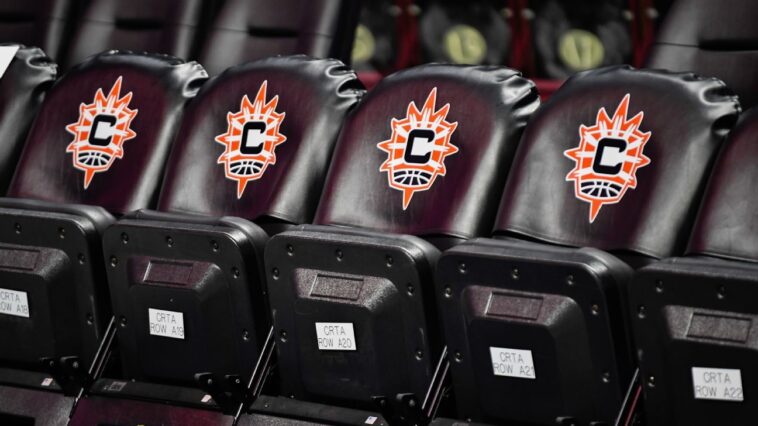-
Alexa Philippou

Alexa Philippou
ESPN
- Covers women’s college basketball and the WNBA
- Previously covered UConn and the WNBA Connecticut Sun for the Hartford Courant
- Stanford graduate and Baltimore native with further experience at the Dallas Morning News, Seattle Times and Cincinnati Enquirer
-
Ramona Shelburne

Ramona Shelburne
ESPN Senior Writer
- Senior writer for ESPN.com
- Spent seven years at the Los Angeles Daily News
Aug 19, 2025, 11:11 AM ET
The Connecticut Sun ownership intends to present multiple options to the WNBA as it looks to salvage what would have been a record-breaking $325 million franchise sale, sources with knowledge of the situation told ESPN.
The Mohegan tribe, which has owned the franchise since buying and relocating the Orlando Miracle in 2003, is seeking clarity on the league’s desired path forward for the organization, sources said, after an agreement to sell the team to a group led by former Boston Celtics minority owner Steve Pagliuca was met with resistance from the league office.
After news broke of the deal’s existence — and Pagliuca’s eventual plan to relocate the franchise to Boston — a league statement emphasized that “relocation decisions are made by the WNBA Board of Governors and not by individual teams,” and that cities that have already gone through the expansion process have priority over Boston, which did not submit an expansion bid in any of the three recent expansion rounds over the past three years.
Among the Mohegan tribe’s likely proposals to the league, according to sources:
• A full franchise sale to Pagliuca’s group.
• A sale to a group headlined by former Milwaukee Bucks owner Marc Lasry, who would move the team to Hartford.
• Selling a minority stake in the organization.
• Allowing the league to purchase the franchise for $325 million and relocate it from the WNBA’s smallest market.
A source close to the ownership group says the tribe is frustrated and feels the league is presenting a one-path option: relocation of the team to a market of their choosing at a value of their choosing. The league, in recent weeks, offered to purchase the Sun for $250 million and not charge the buyer an additional relocation fee — which would allow the league to facilitate a sale to one of its preferred expansion cities, according to sources. That offer was presented before Pagliuca’s bid of $325 million was reported on Aug. 2, sources said.
The tribe had informed the league that it had reached a deal with Pagliuca to buy the team and presented a general executive summary with the terms of the agreement on July 2, sources said. The ownership group did not present a signed term sheet at that time, according to sources, per guidance from their investment firm Allen & Co.
While that deal did not specifically mention Boston, Pagliuca’s intention would be to move the team there, pending WNBA Board of Governors approval, as early as the 2027 season, according to sources. Pagliuca has also committed to building a $100 million practice facility.
The Sun played to sellout crowds at TD Garden in Boston two years in a row, with WNBA commissioner Cathy Engelbert in attendance. Sources said the league is concerned that TD Garden might not be able to host a full slate of games because of scheduling issues, meaning some home games would have to be played 50 miles away at the Amica Mutual Pavilion in Providence, Rhode Island.
The Pagliuca group does not believe that will be a significant issue, sources said.
The biggest issue the league has raised with the tribe regarding a relocation of the Sun to Boston, sources said, was Boston’s failure to submit an expansion proposal. But after operating the franchise at a loss over the past two decades, the tribe believes it should be able to sell the franchise for the highest possible price. It also sees the value of keeping the team in New England and in the hands of an experienced former NBA minority partner.
Sources told ESPN that the league would consider a potential Boston team in a later round of expansion, and that new Celtics owner Bill Chisholm would be the league’s preferred owner for a WNBA franchise. Massachusetts governor Maura Healey, who played collegiately at Harvard and has been trying to help bring a WNBA team to Boston, has already been in communication with Chisholm, sources said.
The potential sale of the Sun comes at a pivotal moment for the league, when franchise valuations, television viewership and player popularity are soaring, while at the same time new media rights agreements are expected to make the league profitable for the first time in its 29 years of existence.
It also runs concurrent with the league’s largest expansion effort since its early years, which will see the WNBA reach a record-high 18 teams in 2030. At the end of June, the league announced it had awarded new franchises to Detroit, Cleveland and Philadelphia at a cost of $250 million each.
In the crosshairs is one of the WNBA’s longest-tenured ownership groups — in fact, its first non-NBA owner — looking to keep pace with a rapidly evolving landscape in which larger arenas, player investment and, in particular, state-of-the-art practice facilities are increasingly becoming the leaguewide standard.
The Sun decided to launch a process to explore investment options last season, sources told ESPN, initially intending to assess opportunities for a limited partnership sale for an infrastructure build, while keeping open the possibility of a full sale.
After informing the WNBA of its plans, the league requested the tribe allow the Cleveland Cavaliers ownership to submit a bid before launching its sale exploration process, sources said, because Cleveland was considered one of the strongest expansion candidates and could facilitate a relocation on a short timetable.
Selling the Sun to Cleveland would also have presumably opened up another expansion slot to a city such as Houston, which Engelbert highlighted as “the one we have our eye on” at the league’s expansion announcement in June.
Houston has a rich WNBA history from the Houston Comets franchise, and an existing NBA ownership group ready to support a WNBA team also eventually raised its bid to the same $250 million fee of the three cities who were awarded teams in June, according to sources.
However, Sun ownership declined Cleveland’s bid, which sources said came in slightly lower than the subsequent expansion fee, after it was advised it could get more money from other offers.
A source close to the ownership group says the tribe feels the league became antagonistic toward the sale after they declined Cleveland’s bid and chose to explore other interested parties.
In April, sources said the league sent a letter to the Sun stating that any sale would be subject to approval by the WNBA’s Board of Governors and that the tribe “does not have the right … to change the playing site of the Team’s home games from Mohegan Sun Arena or to conduct any Team operations outside of the Team Member’s Territory (which is defined as the 75-mile area surrounding Montville, Connecticut and does not include Boston).”
The league sent a similar letter to the tribe in June, sources said, to further underscore that league rules prohibited the Sun from changing their base of operations as a part of any sale.
This is standard in both the NBA and WNBA. For example, the Golden State Warriors needed Board of Governors approval to move their home games from Oracle Arena in Oakland to the Chase Center in San Francisco in 2019.
After the period of exclusivity ran out on the Pagliuca bid, the Lasry group matched Pagliuca’s bid of $325 million, but sources say the league has also told the Sun it would not approve a move to Hartford, which is 45 miles away from Uncasville and within the team’s territory.
There’s still a path for the tribe to maintain ownership of the team. It could sell a minority stake in the franchise and hold games in both Hartford at PeoplesBank Arena and in Uncasville, or it could stay the course and retain full control. The ownership group could self-fund a practice facility or work with the state to fund one and have the team lease it.



